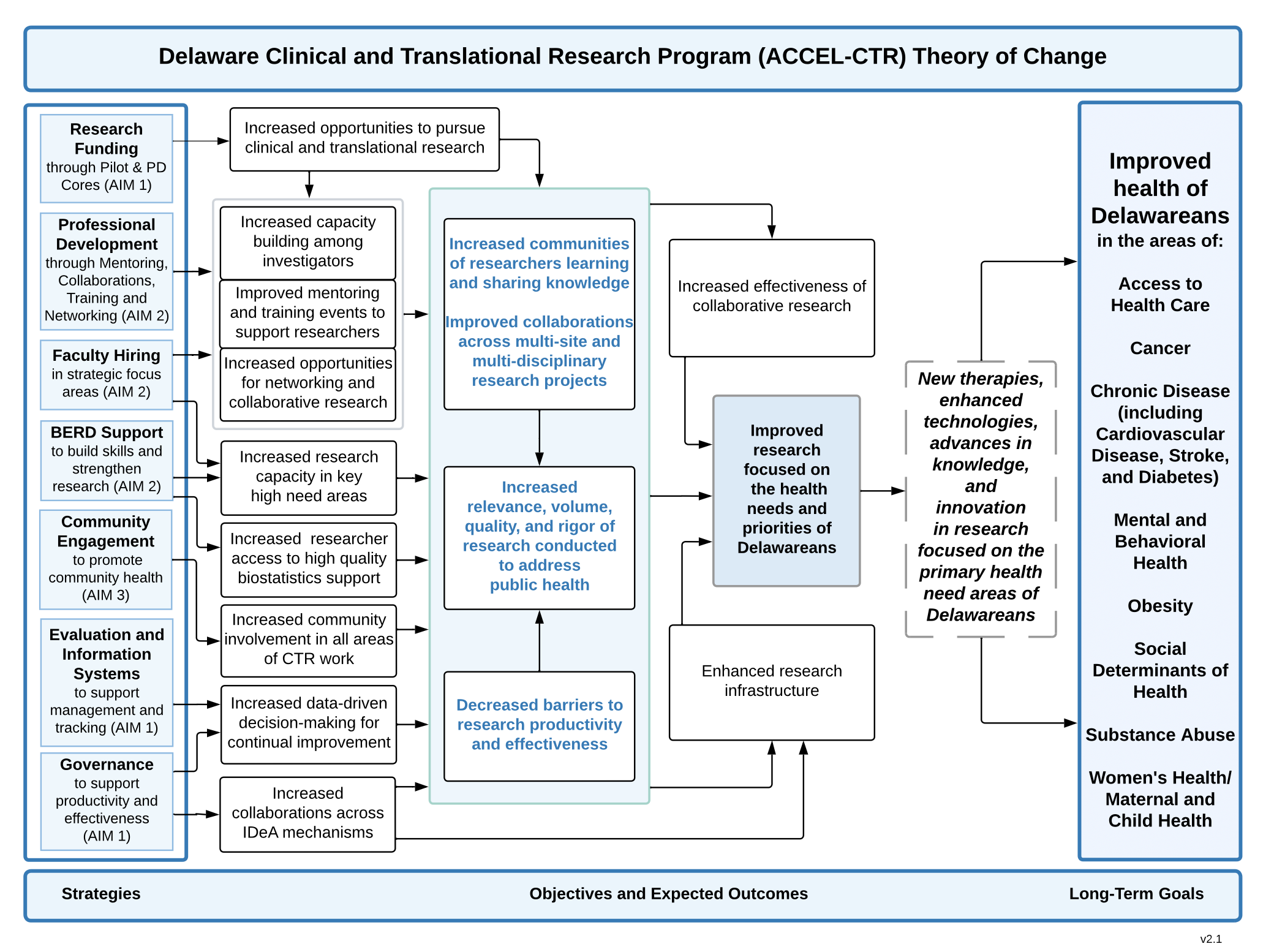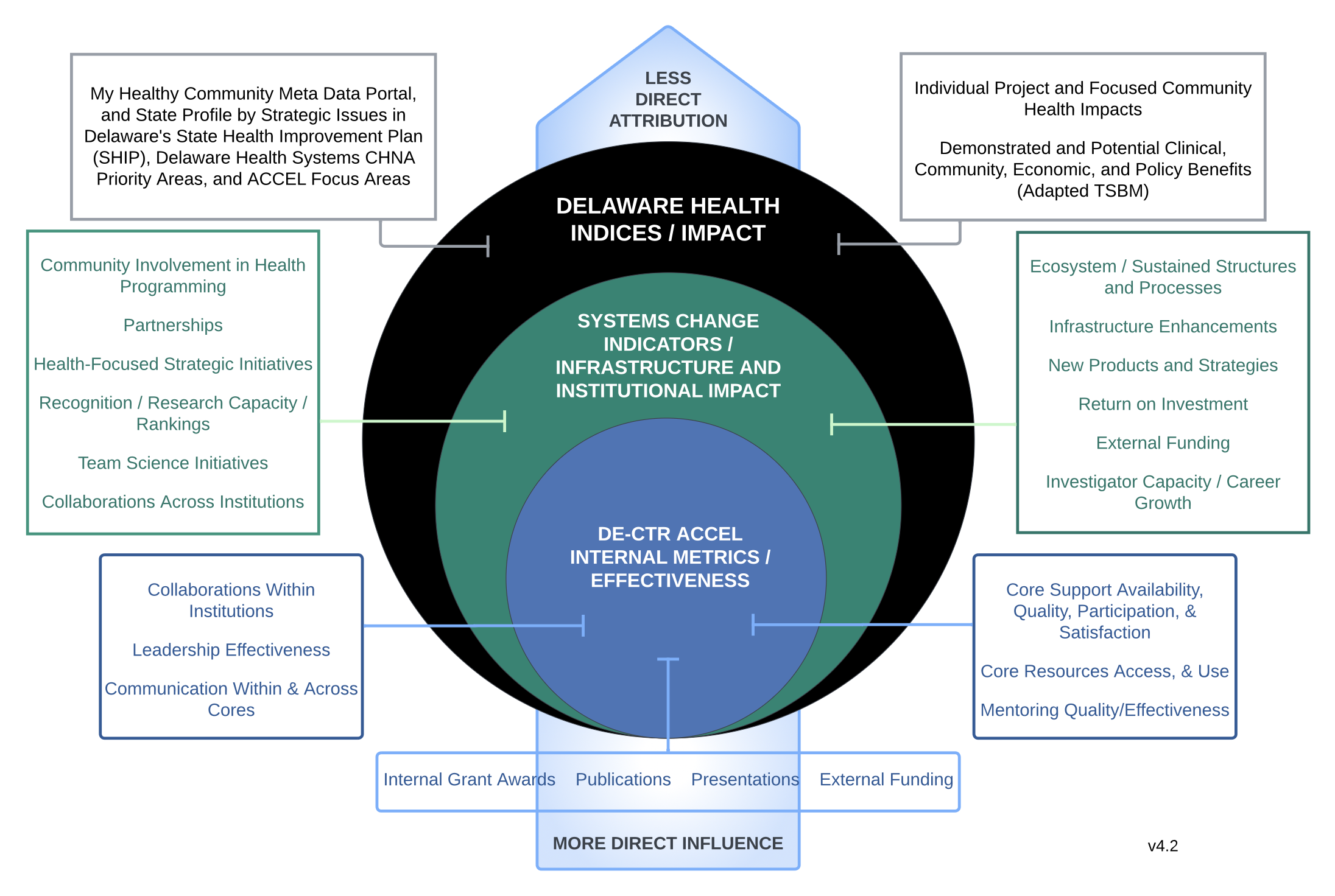Measuring Our Impact
Tracking and Evaluation (TEVAL) is charged with developing a comprehensive evaluation system to foster continuous improvement of the Delaware Clinical and Translational Research Program (ACCEL-CTR), referred to as ACCEL, and assess the impacts of ACCEL on improving the research infrastructure and ultimately improving the health of Delawareans. In doing this, TEVAL has a dual role:
- Operating as a critical friend, by providing data, collaborative results interpretation, and recommendations, to facilitate data-driven decision-making, enabling ACCEL and its Core components to meet short and long-term term objectives and optimize effectiveness; and
- Reporting outcomes and impacts to evaluate the success of ACCEL in achieving its long-term goals and in meeting NIH objectives of enhancing infrastructure, strengthening research focused on health needs, and fostering collaborative research.
The Measuring Our Impacts page focuses on ACCEL outcomes and impacts. The following sections are included:
- ACCEL Investigator Profiles 🕵️: Links to impact profiles for ACCEL investigators. These profiles use the Translational Science Benefits Model (TSBM) to explain the purpose and benefits of research by ACCEL investigators.
- ACCEL Institutional Impact Profiles 🏛️: Coming soon. Links to impact profiles showing the benefits of ACCEL to its member institutions in the areas of recognition, partnerships, infrastructure, and ecosystem.
- ACCEL by the Numbers 📈: Coming soon. An infographic highlighting ACCEL activities and outcomes.
- ACCEL Evaluation Research Briefs 📑: Links to public reports produced by the TEVAL Core, along with our collaborators and community partners.
- ACCEL Theory of Change 🔄: A graphical representation of ACCEL’s theory of change (ToC). The ToC explains the rationale underlying the relationship between ACCEL strategies and long-term goals. TEVAL Core uses an evaluation matrix aligned with the ToC to guide data collection and analyses. Thus, the matrix is used to embed evaluation into the ACCEL ToC.
- ACCEL Impact Model 🌎: A multi-level impact model aligned with ACCEL’s theory of change that identifies indicators of impact at three levels – internal metrics of effectiveness, infrastructure and institutional change, and public health.
- ACCEL Evaluation Reports and Presentations 📊: List of evaluation reports and presentations produced by the TEVAL Core for ACCEL CTR and Core leadership.
ACCEL Investigator Profiles 🕵️
Congenital heart disease: Family-based psychosocial interventions
Congenital heart defects (CHD) are widely recognized as the most common birth defect in the United States. Up to 30–50% of individuals with CHD experience some form of neurodevelopmental or psychological difficulty, such as learning challenges, attention deficits, or anxiety. Open the link to Dr. Sood’s impact profile to read how her research addresses these issues and promotes positive neurodevelopmental and psychosocial outcomes for patients with congenital heart disease and their families.

Early detection and interventions for infants and children with movement delays
Movement delays stem from a variety of causes, including brain injuries occurring before, during, or soon after birth. Most children with motor delays, such as children with cerebral palsy, are not diagnosed in the first two years of life, thus missing a critical window to implement early, effective interventions. Dr. Lobo’s research focuses on designing and testing assessments, interventions, and rehabilitation devices that maximize early motor development for infants and children with neuromotor movement disorders. Follow the link to read about the clinical, community, economic, and policy impacts of Dr. Lobo’s research.

Cancer Prevention and Control
Cancer remains a leading public health concern, but prevention and early detection can significantly reduce its impact on our lives. Dr. Siegel’s research focuses on understanding and identifying multilevel characteristics and potentially modifiable risk factors associated with cancer. Open the link to Dr. Siegel’s impact profile to review key benefits that have emerged from his research.

Firearm Violence Prevention and Intervention
Firearm violence is a complex public health challenge that requires collaborative, evidence-based solutions. Dr. Chen’s research focuses on firearm violence prevention and intervention and the impact of community violence exposure on health. Follow the link to Dr. Chen’s impact profile to learn about the clinical, community, economic, and policy benefits of his research.

ACCEL Institutional Impact Profiles 🏛️
Coming soon!
ACCEL by the Numbers 📈
Coming soon!
ACCEL Evaluation Research Briefs 📑
- Coming soon
ACCEL Theory of Change 🔄

ACCEL Impact Model 🌎

ACCEL Evaluation Reports and Presentations 📊
2025 to date
Culnane, M., Jelenewicz, S., & Giancola, S. (2025, January). DE-CTR ACCEL: Community Advisory Council Case Study (T25-003). Newark, DE: Center for Research in Education and Social Policy.
Culnane, M., Jelenewicz, S., & Giancola, S. (2025, January). DE-CTR ACCEL: 2025 JIN-CARE Focus Group Results (T25-002). Newark, DE: Center for Research in Education and Social Policy.
2024
Culnane, M. (2024, November). DE-CTR ACCEL: The 10th Annual Community Research Exchange (CRE) Post-Conference Survey Findings (T24-029). Newark, DE: Center for Research in Education and Social Policy.
Giancola, S. (2024, October). Measuring infrastructure changes and institutional impact. Paper accepted for the annual meeting of the American Evaluation Association, Portland, OR.
Giancola, S. (2024, September). DE-CTR ACCEL: September 2024 Metrics Snapshot (I24-015). Newark, DE: Center for Research in Education and Social Policy.
Culnane, M., Bathon, J., & Giancola, S. (2024, February). DE-CTR ACCEL: 2024 JIN-CARE Focus Group Results (T24-002). Newark, DE: Center for Research in Education and Social Policy.
2023
Giancola, S. (2023). External Evaluation of the MCCTR Tracking and Evaluation Core (T23-001). Newark, DE: Center for Research in Education and Social Policy.
Giancola, S., & Trochim, W. (2023, October). Telling the story of potential impacts in clinical and translational science. Multipaper session chaired at the annual meeting of the American Evaluation Association, Indianapolis, IN.
Culnane, M., & Giancola, S. (2023, October). Pathways to [potential] impacts using the Translational Science Benefits Model. Paper presented at the annual meeting of the American Evaluation Association, Indianapolis, IN.
Culnane, M. (2023, October). Using Demographic Data to Build Bi-directional Relationships between ACCEL Scientists and the Community. Paper presented at the annual meeting of the American Evaluation Association, Indianapolis, IN.
Giancola, S., Stevenson, J., & Philibert, I. (2023, October). Stories of challenges to evaluation over time: CTR evaluator survey results. Panel session at the annual meeting of the American Evaluation Association, Indianapolis, IN.
Giancola, S. (2023, September). DE-CTR ACCEL: 2023 ICE Report (T23-013). Newark, DE: Center for Research in Education and Social Policy.
Giancola, S., & Culnane, M. (2023, August). Delaware CTR ACCEL Evaluation. Presentation at the Northeast Regional IDeA Conference (NERIC), Wilmington, DE.
Culnane, M. (2023, June). DE-CTR ACCEL BERD Core June 2023 CSQ-3 Results (I23-010). Newark, DE: Center for Research in Education and Social Policy.
Culnane, M. (2023, May). DE-CTR ACCEL: The 9th Annual Community Research Exchange (CRE) Post Conference Survey Findings (T23-010). Newark, DE: Center for Research in Education and Social Policy.
Culnane, M. (2023, February). DE-CTR ACCEL CEO Core February 2023 CSQ-3 Results (I23-005). Newark, DE: Center for Research in Education and Social Policy.
Culnane, M. (2023, January). DE-CTR ACCEL BERD Core January 2023 CSQ-3 Results (I23-003). Newark, DE: Center for Research in Education and Social Policy.
2022
Giancola, S., & Culnane, M. (2022, November). Using IFME to inform evaluation shift from tracking to assessing. Panel presentation at the annual meeting of the American Evaluation Association, New Orleans, LA.
Culnane, M. (2022, October). DE-CTR ACCEL CEO Core October 2022 CSQ-3 Results (I22-008). Newark, DE: Center for Research in Education and Social Policy.
Culnane, M. (2022, August). DE-CTR ACCEL BERD Core August 2022 CSQ-3 Results (I22-005). Newark, DE: Center for Research in Education and Social Policy.
Culnane, M., & Giancola, S. (2022, March). DE-CTR ACCEL targeted impact evaluation: Rehabilitation research portfolio (T22-006). Newark, DE: Center for Research in Education and Social Policy.
Culnane, M. (2022, February). DE-CTR ACCEL: ACCEL Scholar Study Findings (S22-004). Newark, DE: Center for Research in Education and Social Policy.
Culnane, M., Manal, S., Giancola, S., & Farley, J. (2022, February). Delaware Community Health Needs Assessment (CHNA): Ten-year retrospective study (T22-005). Newark, DE: Center for Research in Education and Social Policy.
Giancola, S. (2022, February). DE-CTR ACCEL Accomplishments (I22-003). Newark, DE: Center for Research in Education and Social Policy.
Giancola, S. (2022, February). DE-CTR ACCEL January 2022 Snapshot (I22-001). Newark, DE: Center for Research in Education and Social Policy.
Giancola, S. (2022, January). DE-CTR ACCEL BERD Core January 2022 CSQ-3 Results (I22-002). Newark, DE: Center for Research in Education and Social Policy.
Center for Research in Education and Social Policy. (2022). The State of Our Union: Black Girls in Delaware--Survey Results (PB22-001). Newark, DE: Center for Research in Education and Social Policy.
2021
Center for Research in Education and Social Policy. (2021). The State of Our Union: Black Girls in Delaware--Resilience (PB21-005). Newark, DE: Center for Research in Education and Social Policy.
Center for Research in Education and Social Policy. (2021). The State of Our Union: Black Girls in Delaware--Safety (PB21-004). Newark, DE: Center for Research in Education and Social Policy.
Center for Research in Education and Social Policy. (2021). The State of Our Union: Black Girls in Delaware--Racism (PB21-003). Newark, DE: Center for Research in Education and Social Policy.
Center for Research in Education and Social Policy. (2021). The State of Our Union: Black Girls in Delaware--Image (PB21-002). Newark, DE: Center for Research in Education and Social Policy.
Center for Research in Education and Social Policy. (2021). The State of Our Union: Black Girls in Delaware--Health (PB21-001). Newark, DE: Center for Research in Education and Social Policy.
Hill, C., & Giancola, S. (2021, November). DE-CTR ACCEL: PILOT Core letter of intent survey findings (T21-034). Newark, DE: Center for Research in Education and Social Policy.
Culnane, M. (2021, July). DE-CTR ACCEL: Health impacts of toxic pollution post retreat survey findings (T21-022). Newark, DE: Center for Research in Education and Social Policy.
Giancola, S., & Culnane, A. (March 2021). Using Theory-Based Methods as a Foundation to Evaluate Systemic Change Initiatives. Webinar presentation for the American Evaluation Association Translational Research Evaluation TIG and ACTS Evaluation SIG.
Giancola, S., & Riser, D. (February 2021). DE-CTR ACCEL: ICE Survey Results (T21-004). Newark, DE: Center for Research in Education and Social Policy.
Culnane, M. (January 2021). Targeted Studies and Broader Impacts: Phase I Rehabilitation Research. Webinar presentation for the American Evaluation Association Translational Research Evaluation TIG.
2020
Culnane, M. & Karpyn, A. (November 2020). The Community Engaged Research Pilot Review Scoring Instrument: Exploratory Analyses (T20-019). Newark, DE: Center for Research in Education and Social Policy.
Culnane, M., & Giancola, S. (October 2020). Evaluating transformative health milestones linked to Delaware’s state and community priorities. Panel presentation for the American Evaluation Association Annual Meeting.
Culnane, M. & Giancola, S. (August 2020). ACCEL Clinical and Translational Research Program Investigator Needs Assessment August 2020: Final Report (T20-012). Newark, DE: Center for Research in Education and Social Policy.
Culnane, M. & Giancola, S. (May 2020). ACCEL Clinical and Translational Research Program Investigator Needs Assessment April 2020: Interim Report (S20-013). Newark, DE: Center for Research in Education and Social Policy.
Culnane, M. & Giancola, S. (February 2020). DE-CTR ACCEL Behavioral and Mental Health Research Retreat Evaluation Results (T20-003). Newark, DE: Center for Research in Education and Social Policy.
Culnane, M. & Giancola, S. (January 2020). DE-CTR ACCEL 2019 JIN-CARE Needs Assessment: Brief Report (S20-002). Newark, DE: Center for Research in Education and Social Policy.
2019
Culnane, M., & Giancola, S. (November 2019). DE-CTR ACCEL: The 6th Annual Community Research Exchange (CRE) Post Conference Survey Findings (T19-018). Newark, DE: Center for Research in Education and Social Policy.
Giancola, S. (2019, November). Leave no community behind: Assessing and aligning multi-community needs to inform translational research. Panel presentation at the annual meeting of the American Evaluation Association, Minneapolis, MN.
Giancola, S. (2019, November). Role of evaluation within IDeA-CTRnet Program. Paper presentation at the annual meeting of the American Evaluation Association, Minneapolis, MN.
Giancola, S. (2019, November). Evaluation engineering: Using engineering principles to improve evaluation methodology. Poster presentation at the annual meeting of the American Evaluation Association, Minneapolis, MN.
Culnane, M., Giancola, S., Karpyn, A., & Hill, E. (2019, November). Engaging the community: Using evaluation to inform a CTR community-engaged research program. Paper presentation at the annual meeting of the American Evaluation Association, Minneapolis, MN.
Culnane, M., & Giancola, S. (October 2019). DE-CTR ACCEL: Community Engagement and Outreach (CEO) Case Study (T19-014). Newark, DE: Center for Research in Education and Social Policy.
Culnane, M., & Matthias, J. (July 2019). DE-CTR ACCEL Supplemental Report: Balancing Your Life and Work Story Workshop: Post-Workshop Survey Results June 6, 2019 (S19-026). Newark, DE: Center for Research in Education and Social Policy.
Culnane, M., Giancola, S., & Riser, D. (February 2019). DE-CTR ACCEL: 2018 Junior Investigators’ Network (JIN) Evaluation Results (T19-001). Newark, DE: Center for Research in Education and Social Policy.